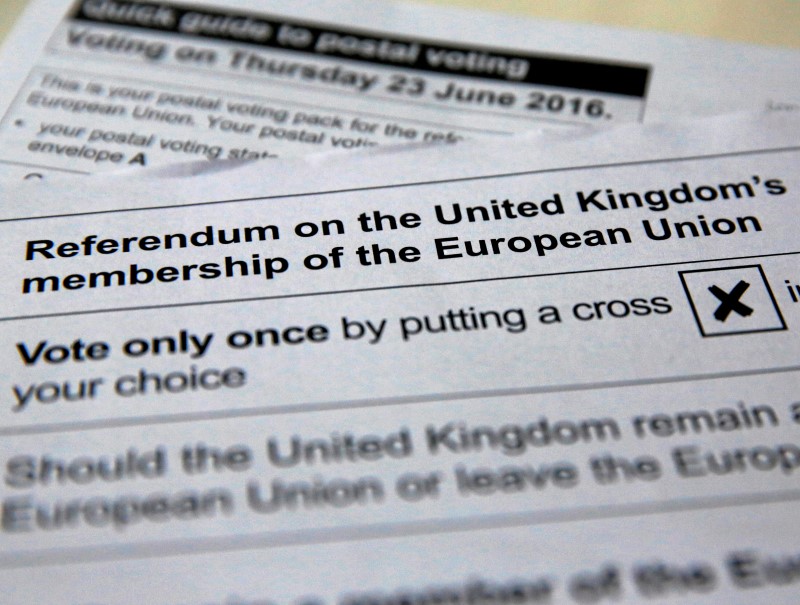By Jamie McGeever
LONDON (Reuters) - If Britons vote to take their country out of the European Union on June 23, no corner of the global financial market complex will emerge unscathed.
The invisible thread that links assets as diverse as gold, bank stocks, the Japanese yen and government bonds would be yanked sharply by Brexit, an event the Bank of England said on Thursday risks "adverse spill-overs to the global economy".
With global interest rates and bond yields the lowest on record, central banks running low on crisis-fighting tools and the post-2008 economic recovery flagging, that thread could quickly unravel, with serious consequences for all markets.
GRAPHIC: http://reut.rs/1OtYjrc
So why will the will of one country's people in one referendum have such a profound impact on global markets?
The answer is partly how interconnected global markets are, and partly timing - the world economic cycle is already very long in the tooth and central banks have far fewer options open to them after nearly a decade of extraordinary policy support.
INTEREST RATES, YIELDS
Global interest rates are their lowest for 5,000 years, according to Bank of America (NYSE:BAC), but central banks could still cut them further. That could mean the U.S. Federal Reserve reversing its slow-starting tightening cycle, and European Central Bank and Bank of Japan rates going deeper into negative territory.
Lower rates would also depress bond yields even further, tightening the screw on central and commercial banks.
Over $8 trillion worth of sovereign bonds already carry a negative yield, according to JPMorgan (NYSE:JPM). This means holders of Japanese, German and Swiss debt are paying these governments for the privilege of lending to them, in some cases out to 20 years.
They are willing to accept they will not get all their money back. Even deeper negative yields would increase these losses, raising further doubt that these are truly "safe haven" assets.
But the immediate economic and political uncertainty after a Brexit vote would likely be so great that demand for these bonds would rise anyway, pulling yields even lower. Yield curves, the difference between short- and longer-dated bond borrowing costs, would flatten further.
They are already their flattest for years around the developed world, meaning the premium investors expect for holding longer-dated bonds is shrinking. This is often an ominous signal of low inflation or deflation, and slowing economic growth or possibly recession.
If "core" bond yields would likely fall, yields on lower-rated and riskier bonds would likely rise, widening the spread between the two. This would increase the financing pressure on a wide range of companies around the world and governments in euro zone "periphery" countries like Greece, Italy and Spain.
BANKS - CENTRAL AND COMMERCIAL
Flat yield curves are bad news for banks, who make money from borrowing short-term at low rates and lending longer-term at higher rates. Financial stocks have been hit hard this year as the curve flattening has accelerated.
Euro zone banks are down 30 percent this year, Japanese banks 35 percent, UK banks 20 percent, and U.S. banks 10 percent.
Banks are also being squeezed by negative deposit rates. The ECB, Bank of Japan and Swiss National Bank all charge banks for depositing cash.
It may even become cheaper for banks to put billions of yen, euros or francs of their customers' cash in vaults -- a possibility German lender Commerzbank (DE:CBKG) is examining.
As for central banks, any move deeper into the uncharted world of negative interest rates would be taken reluctantly.
In the case of the ECB, declining yields would further cut the amount of bonds eligible for purchase as part of its quantitative easing stimulus programme. That would make its inflation target of just under 2 percent much harder to achieve, in turn putting its credibility under even greater scrutiny.
FINANCIAL PLUMBING
Just as the 2007-08 financial crisis was caused by unprecedented stress in the banking system, analysts fear Brexit fallout could again threaten to block the global financial system's plumbing.
Banks have recovered from 2007-08 but stresses are already appearing in more obscure pockets of dollar-based FX and rates markets that are hitting levels more associated with periods of crisis. The premium for dollars over yen in the cross currency basis market is its highest in years.
Spreads between Libor rates and overnight index swap (OIS) rates, broadly a measure of investors' perception of credit risk in the banking system, are also widening. In normal conditions, Libor/OIS spreads should be virtually zero.
STOCKS
World stocks are in their longest bull run in history that began on 9 March, 2009. But Wall Street's peak was reached over a year ago, profit growth has slumped, and companies are reluctant to reinvest their record cash piles.
European stocks are down 13 percent this year, Japan down 20 percent, and Wall Street is flat. Would they be able to withstand the political, economic and investment shock a Brexit would likely deliver, especially with risk appetite so fragile?
CURRENCIES
Like 2008, a vote for Brexit would almost certainly increase demand for the pre-eminent currency in global trade, banking and financial market trading: the dollar.
Dollar credit to non-U.S. banks stands at almost $10 trillion, according to the Bank for International Settlements, of which $3.3 trillion is in emerging markets. A stronger dollar will increase the overall debt burden for these companies, and many emerging market countries, who would be forced to draw down their FX reserves to counter the expected capital outflow and downward pressure on their currencies.

Japan's yen, another safe-haven currency, would probably rise too, perhaps as much as 14 percent, according to Goldman Sachs (NYSE:GS). This would not be welcome in Tokyo, where policymakers are struggling to kill off deflation once and for all, stoke inflation, reflate the economy and heal the banking system. A higher exchange rate would be damaging on all those fronts.